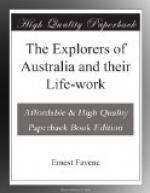Gregory was now convinced that the sandy tract before him was not to be crossed with the means at his command, so reluctantly he had to return to the Oakover and follow that river down to its junction with the De Grey. Down the united streams, which now bore the name of the De Grey, the weary explorers travelled through good fertile land, until the coast was reached on the 25th of September. The worn-out state of their horses delayed them greatly in getting across a piece of dry country between the Yule and the Sherlock, where one animal had to be abandoned.
On the 18th of October, they reached Nickol Bay, and were gladly welcomed by the crew of the Dolphin, who had profitably passed their time in collecting several tons of pearl-shell and a few pearls. On the 23rd the horses and equipment were shipped, and the Dolphin sailed for Fremantle.
This journey ended Frank Gregory’s active life as an explorer; and it was a noteworthy career which now closed. For the western colony he had thrown open to settlement the vast area of the north-western coastal territory; and after relieving the Murchison from the stigma of barrenness that rested on it, he had discovered and made known all the rivers to the north and east, until the Oakover was reached.
It is singular that Frank Gregory should, like nearly all explorers, have erred greatly in the deductions he drew. When forced to turn back from the country beyond the Oakover, he much laments the fact, because, not only had we now attained to within a very few miles of the longitude in which, from various geographical data, there are just grounds for believing that a large river may be found to exist draining central Australia; but the character of the country appeared strongly to indicate the vicinity of such a feature.”
Of course we now know that no such river drains the centre of Australia. On the contrary, beyond Gregory’s eastern limit there occurs a long stretch of coastline unmarked by the mouth of any river. Inland, to the southward, the country even in this day is known as the most hostile and repellant desert in Australia, markedly deficient in continuous watercourses. Providence, then, restrained his footsteps from a land wherein earth and sun seem to unite in hostility against the white intruder. It is a pity that Frank Gregory did not give his undoubted powers of description free scope in his Journal. Now and again he gives them rein; but soon calls a halt, as though alarmed that picturesque language should be found in a scientific, geographical journal. His brother Augustus was unfortunately just as correct and precise.
Frank went to reside in Queensland in 1862, and was nominated to the Legislative Council of that colony in 1874. Before going to Queensland he had acted for some time as Surveyor-General of Western Australia. He was married at Ipswich, Queensland, to the daughter of Alexander Hume. He held office for some time in the McIlwraith Ministry, as Postmaster-General. He was a gold medallist of the Royal Geographical Society, and one of the best of the Australian explorers, as bushman, navigator, surveyor, and scientist. He died at Toowoomba, in 1888, on the 24th of October.




